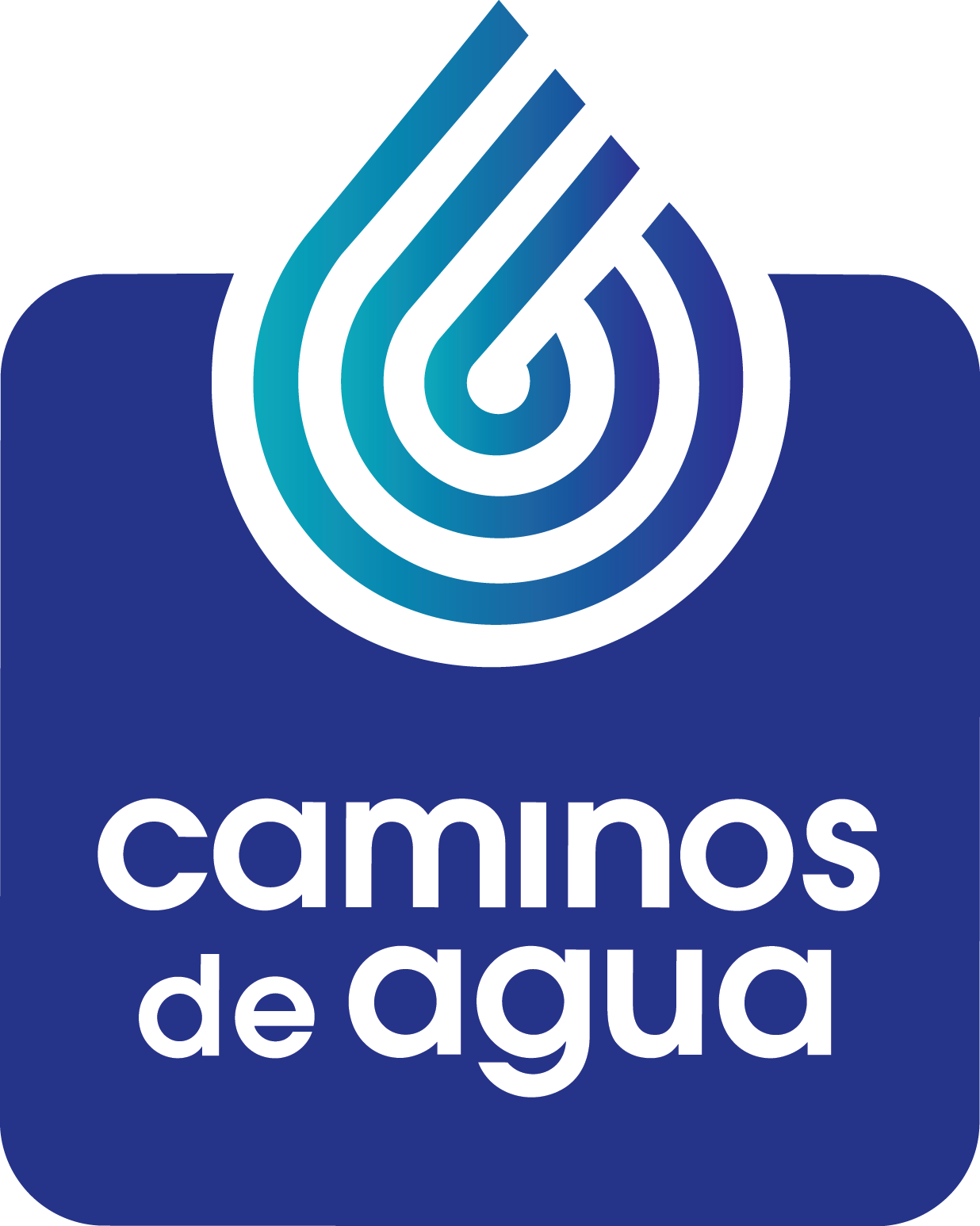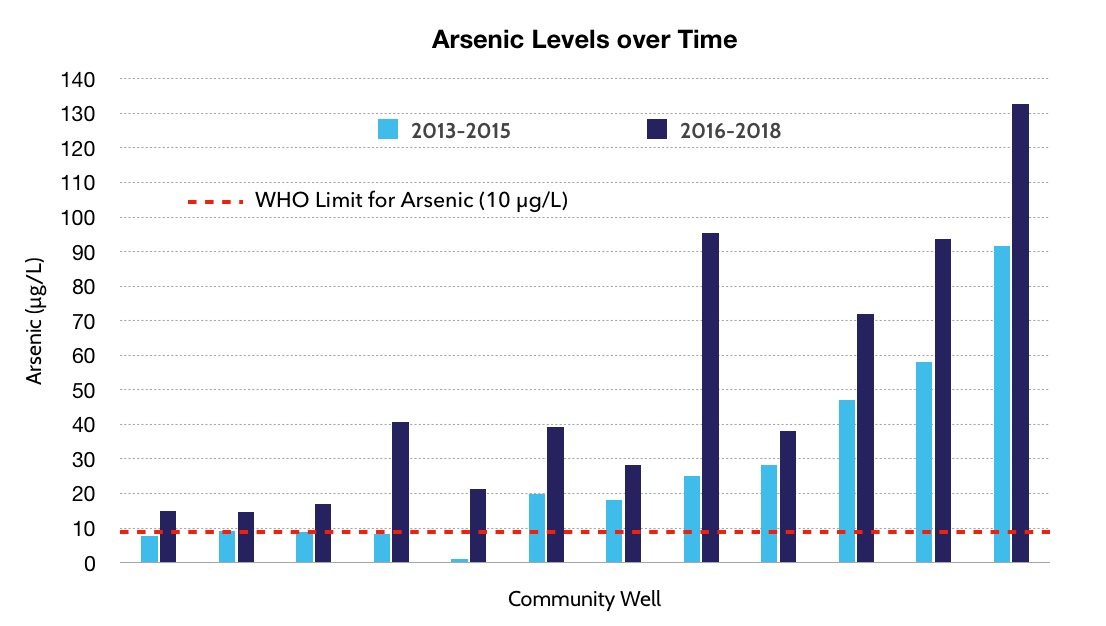Waterways - Newsletter Caminos de Agua (Vol. 1, Issue 2)
Para la versión en español de este post, haz clic aquí.
Vol. 1, Issue 2: Dec 2018
A Caminos de Agua Water Quality Study Highlights Growing Health Threats From Water Contamination
Saúl Juárez, Caminos de Agua’s Community Project Coordinator, explaining water quality reports in San Diego de la Unión.
In late 2017, Caminos de Agua was contacted by the municipal government of San Diego de la Unión – located just north of San Miguel de Allende. The Mayor, Juan Carlos Castillo, was increasingly worried that the well water in his municipality was becoming contaminated with arsenic and fluoride. At the suggestion of a staff member, he visited Caminos de Agua to learn more about the growth of these contaminants in the Alto Río Laja Watershed. Show More.
As a result of that visit, Mayor Castillo asked Caminos de Agua to coordinate a water quality study to test all 28 rural wells in the municipality. The proposal was first presented to the 28 rural Water Committees (community representatives responsible for managing their wells). While many were unaware of the growing threat of arsenic and fluoride prior to the meeting, most were familiar with the health impacts becoming more prevalent in their communities.
Receiving approval, Caminos de Agua brought together a team of experts and others from Texas A&M University, University of Guanajuato, and the San Diego de la Union municipal government. Once out in the field, the team was able to test 26 out of the 28 well sites.
The study found excessive fluoride levels in 15 of the 26 tested communities, with one site registering 10 times higher than the World Health Organization (WHO) limit for drinking water. A much more disturbing finding is that arsenic levels, which had historically been manageable in this region, are spiking. All but three of the sites were above the WHO limit for arsenic, and a staggering 12 sites are now between 2 and 10 times that limit.
Arsenic levels have dramatically increased in San Diego de la Unión in recent years.
Unfortunately, the arsenic levels in San Diego de la Unión are part of a growing trend seen throughout the watershed. In just the last several years, many wells – including some of those in San Miguel - are seeing increases in arsenic concentrations.
Excessive intake of arsenic and fluoride are associated with increased rates of dental and skeletal fluorosis, kidney disease, skin disease, numerous cancers, and cognitive development issues in children.
While arsenic levels are getting worse, this appears to be a recent development for most communities. This means that the exposure for the vast majority of the population affected is limited to 2-5 years.
If we start working now, we can get these communities off contaminated water soon and potentially stave off years of accumulated health impacts. But the time to act is now.!
And what happened in San Diego de la Unión?
Having digested the Caminos de Agua water study, Mayor Castillo – in the final days of his term – broke ground on the construction of 90 large-scale rainwater harvesting systems in the municipality’s most impacted communities. This solution will help residents harvest arsenic and fluoride free drinking water for generations to come and it’s a solution we hope to see repeated by other governments throughout the region.
Clean Water Ambassadors Will Demystify Murky Myths
What’s in your water, and what’s to be done about it?
Caminos de Agua is pleased to announce a new program being launched in early 2019 that will answer these questions and more. We call it our Clean Water Ambassador (CWA) program.
CWAs are volunteers who have been trained on the ins and outs of our water supply. The CWA will come to your home, provide on-site assessments of household water filter systems and bottled water, and answer your water-related questions. They can also collect water samples for lab testing of locally common contaminants. Show More.
The fact is, we are in the midst of a water crisis. The water level in our aquifer continues to decline due to overextraction by agriculture, and the water that remains contains potentially toxic levels of arsenic and fluoride.
The cost for a Clean Water Ambassador home consultation will be MXN $500 pesos, which includes preliminary onsite testing of tap water and bottled water, on-site reverse osmosis system efficiency checks, and system recommendations. Any lab testing requested will be charged additionally at MXN $1,200 pesos per sample, which includes testing for arsenic and fluoride – the most prevalent water contaminants in our region. Full details are available on our website. Once any lab tests are completed, the CWA will schedule a follow-up visit to explain your results and answer any questions.
Want a reservation to get your water tested?
You can request a water ambassador visit on the ‘Test My Water’ page. As soon as we launch, an ambassador will be in touch! Want to be a CWA? Please contact us. Thank you!
Taking our water monitoring program from the field to your home.
On The Ground in Pozo
Hondo and La Vaciada
A Case Study
Pozo Hondo resident taking water home from a community cistern.
This is the story of Pozo Hondo and la Vaciada, two small villages located in the State of Guanajuato in central Mexico, but it could be about countless other similar communities in Mexico or other parts of the world.
For as long as residents in these two villages can remember, access to drinking water has been a major problem – with people having to walk long distances, stand in lengthy lines, and carry heavy containers from small natural springs or muddy streams. Show More.
Residents thought their water problems had ended when a well was finally built. But later, they learned that was not the case when it was discovered that their well water was contaminated with seriously unhealthy levels of arsenic and fluoride – some of the worst we have seen.
Building cisterns in Pozo Hondo is a community effort.
Boiling the well water to make it safe to drink was thought to be a solution, but this only results in higher concentrations of these toxic contaminants – causing dental and painful skeletal fluorosis, renal problems, cognitive disorders, and other serious medical conditions. Purchasing bottled water was another option, but, for many, a very expensive one with no assurance of the actual water quality.
Women drive these projects in every aspect, from organizing to construction.
Concerned members of these communities, mostly women, stepped forward and got together with Caminos de Agua and our grassroots partner, CUVA-PAS, to organize and create a workable solution, which turned out to be building rainwater harvesting systems. Caminos de Agua then helped secure funds for 25 systems from the Gonzalo Río Arronte Foundation, and today, many families in these two communities now have year-round access to safe and healthy drinking water.
Caminos de Agua is proud to partner with communities like Pozo Hondo and La Vaciada to implement critically needed water solutions and help facilitate a process that results in stronger, more engaged communities.
Seeking to Change the Emergency Relief Paradigm: Caminos de Agua Becomes A National Finalist for its New Water Filter Design
After the devastating earthquakes and hurricanes that hit the region in 2017 – and after witnessing the extreme inefficiency and cost of shipping bottled water to those emergency zones – Caminos de Agua decided to consider the potential of our technologies for disaster relief situations. We went to work on a new water filter that attaches to nearly any container in minutes and with no training required – ideal for emergency response where the water available can be treated quickly, on site, and with locally available materials. Show More.
At about the size and weight of a 1-liter bottle of water, our new Aguadapt filter concept can produce more than 27,000-liters of drinking water over its lifetime and transition from emergency relief to a permanent water solution for families. Utilizing Caminos de Agua’s certified Ceramic Filter, a refillable cartridge, and a newly-designed universal adapter, Aguadapt removes biological pathogens, organic chemicals, and can even be modified to remove arsenic, fluoride, and other contaminants – all at a price accessible for a family living on less than USD $2 per day.
Aguadapt is completely open-source and meticulously designed to attach to both flat and round-bottom containers as well as standardized plumbing parts – making the possible uses endless and setting it worlds apart from traditional, proprietary water filters.
The Camions de Agua Research & Technical Development Team submitted Aguadapt to 2018’s Dyson Award, an international design competition, and we are thrilled to congratulate our ‘Tech Team’ on being Mexican national finalists!
The Aguadapt universal adapter is now in its first production run and will be piloted with a partner organization in 600 homes in Southern Mexico in the coming months.
Aguadapt
The Staff Spotlight
Melissa Landman
Melissa is a mechanical engineering graduate from the University of Delaware who will soon be ending her year-long internship with Caminos de Agua’s Research and Technology Development Team. Her dedication and work has resulted in important improvements to Caminos de Agua’s ceramic filter design and production process. Show More.
Melissa’s work took exhaustive hours of observation, experimentation, and data analysis – often working in less than ideal conditions. But it wasn’t all work for Melissa as she took full advantage of everything San Miguel has to offer.
When asked about the benefits of working with Caminos de Agua, she responded, “You get to work with a diverse group of people with many different skill sets. Working here has given me the opportunity to apply technical knowledge learned in a classroom setting to a great cause.”
Every Donation Counts!
You make our work possible
Taking water from her cistern.
Checks
Checks can be written in USD or MXN. Find below the details to write a check in your preferred currency.
Checks in USD
can be mailed to:
Caminos de Agua
11S. Green St.,
Unit 1508
Chicago, IL 60607
or delivered to:
Caminos de Agua
c/o Dylan Terrell
La Conexion Box 826A
San Miguel de Allende
Checks in MXN
can be delivered to:
Caminos de Agua Sana, A.C.
Allende #5,
Colonia Insurgentes
San Miguel de Allende,
Gto, México
C.P. 37712
How You Can Get Involved And Make A Difference
The growing health and water availability problems threatening the more than 680,000 people who share the Alta Río Laja Aquifer (which includes the greater San Miguel de Allende area) are both real and documented.
Export-agriculture is driving water usage up, leading the water table to drop 2-3 meters (roughly 6-10 feet) per year. This is causing wells to dry up and contaminating much of the water still available with unhealthy levels of arsenic and fluoride, which create serious health risks. This is the plain unvarnished truth of the matter. Doing something about this situation is the responsibility of all the stakeholders in the area and those everywhere who care about water exploitation, public health, and environmental justice. Caminos de Agua is committed to working in partnership with local communities to create and implement solutions that ensure safe and healthy drinking water for their residents.
Join us in this effort. While financial support continues to be our number one need, we also need the skills of people and organizations. To learn more about our work and make a contribution, click here. To discuss how you can get involved in this critical effort, click here.




